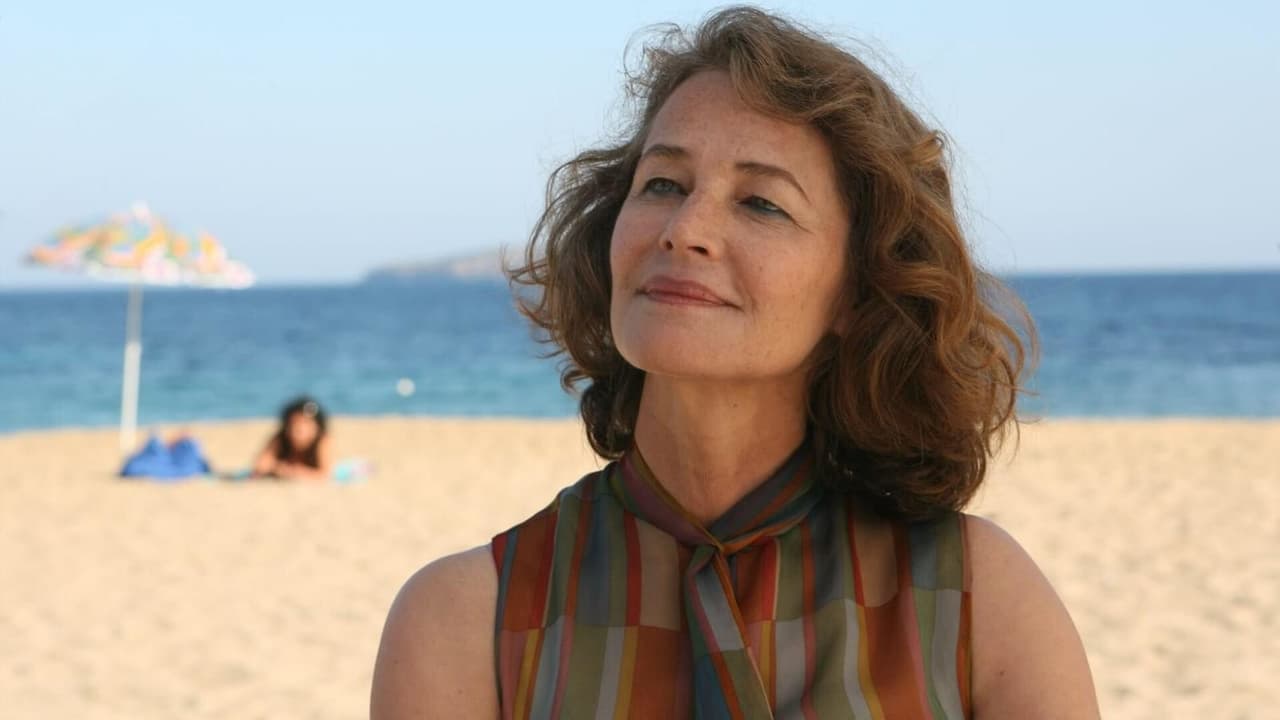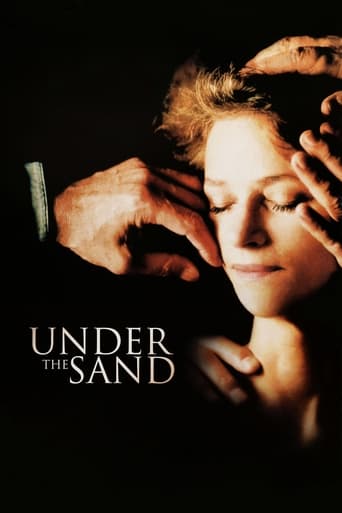HottWwjdIam
There is just so much movie here. For some it may be too much. But in the same secretly sarcastic way most telemarketers say the phrase, the title of this one is particularly apt.
SeeQuant
Blending excellent reporting and strong storytelling, this is a disturbing film truly stranger than fiction
Cissy Évelyne
It really made me laugh, but for some moments I was tearing up because I could relate so much.
Scotty Burke
It is interesting even when nothing much happens, which is for most of its 3-hour running time. Read full review
secondtake
Under the Sand (2000)The plot is simple, almost too simple, and because very little happens, it depends on mood and deeply serious thinking about death to survive. And on Charlotte Rampling to have the nuance and range to pull it off.And it works, overall, because of just those two things: heavy subject and Rampling. There are issues (and tricks, cinematically) with ghosts and memories, but these play small against the bigger strain of the lead woman dealing with this sudden trauma in her life. Even though the main event in the movie happens at the start, I don't dare mention it because its surprise is important (I didn't know it was coming, and liked the way it was handled very much). Director Francois Ozon never seems to quite nail down the pace and editing of his films, at least for American sensibilities. Even the sensationally complex Swimming Pool doesn't quite use its material to propel us in every scene. But let's turn that on its head and say that Ozon uses emptiness and gaps in the action to give his movies breathing room, or maybe, in some old fashioned sense, the make them serious. When nothing is "happening" you can only start to think and dwell on the events, along with the characters. In Under the Sand there is nothing else to do and yet it's exactly what Rampling in her role has to do: think and dwell. It's slow at times, yes, but only if you don't let yourself relax and get absorbed.And, like the character, confuse what is real from what is chimera, and what she needs with what she once had, and even one man from another. Even her fluid bi-lingual abilities add to the duality. By the time you get to the final scene you are left wondering what true love really is, and whether it's worth it. Because maybe it is. She has something most people do not, and it seems like a sickness and a gift at once.
bandw
This is a tour de force for Charlotte Rampling - her performance alone makes this worth watching. Things begin with Marie (Rampling) and her husband Jean (Bruno Cremer) heading out of Paris to their summer home in the country. In following the mundane activities of their trip and first night away we learn quite a bit about them. The rhythms of their married life have long since been grooved. Marie's attachment to Jean is apparent, but Jean's feelings for Marie are less well established and this becomes a relevant plot element.On the day after their arrival at the summer home the couple go to the beach. While Marie suns herself, Jean goes for a swim and he does not come back. Marie goes through all of the expected reactions - waiting anxiously, calling the police, witnessing the search, and finally giving up. It is here that we move into the deeper waters of the story, as it were. The expressions on Jean's face just prior to his going on the swim sets the tone of ambiguity as to the cause of his vanishing. Was his disappearance an accident, suicide, or willful?Marie deals with this bewildering situation by entering into a state of denial and this is where Rampling and Ozon boost this movie beyond the ordinary as they subtly trace the gradual chipping away of Marie's illusions. The reaction shots of Marie's seeing an older man swimming in a pool, or receiving a recorded message that a body has been found, are powerful in their understatement. The use of lighting to accentuate Marie's moods is quite effective, like the use of harsh white light when she is in obvious agony.Rampling is at the top of her form and she completely puts to rest any idea that a woman in her 50s cannot be sexy.The subtext of how Marie's friends try to deal with her reactions is engaging, making you wonder about the best way to deal with a friend in a state of denial. You want to be supportive, but also want to encourage them to face what you think are the realities of the situation.Relationships are always more complicated than the participants understand and, as is the case here, a traumatic event can unleash emotions and thoughts previously unexplored. I took the ambiguous ending to personify the hopes, fears, and unknowables in Marie's relationship with Jean, and maybe in all significant relationships.
gradyharp
François Ozon is a rare director, one who takes a simple story, places it in the eyes and bodies of his cast, and simply lets the tale tell itself. SOUS LE SABLE (UNDER THE SAND) is an unforgettable film experience that probes deeply into our psyches, hearts, and reason: how do we cope with sudden death? Opening quietly in the French countryside, a loving middle-aged couple begins a brief vacation in a family house, quietly and lovingly going about removing dustcovers, opening shuttered windows - settling in for a time of being alone together. Marie (Charlotte Rampling) is a professor of English in Paris (her specialty is Virginia Woolf) and Jean (Bruno Cremer) is her retired husband. Their long-term love is palpable: Ozon provides almost no dialogue, as none is needed to establish this special relationship, so powerful is the non-verbal communication between Rampling and Cremer. They visit the beach the next day and while Marie is sunbathing, Jean goes for a swim - and never returns. Marie searches for him, engages lifeguards, and ultimately returns to Paris, trembling but intact. Months later, while Jean is never found, we see Marie reacting as though he still exists. She visualizes him in various situations and the two actors (yes, Jean is present in these scenes) interact as though nothing has changed. But Marie's friends note with great concern that she is 'delusional' and make various attempts for her to seek professional and emotional help. When news eventually arrives that Jean's body has been found, she internally denies this possibility but eventually returns to the vacation house town to identify the bloated corpse. Even at this point, though obviously in shock, she denies that the corpse is that of her beloved Jean. She walks back to the site where she last saw Jean and in the distance a figure rekindles her hope...Charlotte Rampling delivers a performance wholly committed. She communicates the spectrum of feelings of this challenged strong woman with her eyes, her gazes in the mirror, her interaction with her class of students, her friends, her admirer with such power that makes her Marie a wholly credible creature stricken by loss yet surviving in her chosen manner. It is one of the great performances of cinema. The entire small cast of this film is perfection. Ozon is a magical director and continues to prove he is one of the most honest and quietly powerful figures in today's cinema. Highly recommended.Grady Harp
Philip Van der Veken
François Ozon is quite well known in the world of cinema since his movies "Swimming Pool" and to a lesser extend "8 femmes". But he has made a lot more movies than these two and "Sous le Sable" or "Under the Sand" in English was the last one before these two.It tells the story of a middle aged female college professor and her husband who go on a vacation to their summer house in the southwest of France. When they are on the beach, her husband goes for a swim in the sea, but she decides to stay a bit longer on the beach. She falls asleep and when she wakes up later that day, there is still no sign of her husband. She goes back to their house, but he isn't there either and after the police has searched the beaches and the sea, but couldn't find a trace of him, she returns home alone. Has he left her, was it suicide or did he drown? Because she has no answers and no body to mourn over, she starts acting like if nothing has happened, making it impossible for herself to make the best of the rest of her life that she has left...If you are familiar with the average French movie, than you know that most of the time they talk, talk and talk. Just like they don't seem to be able to have a moment of silence in a Hollywood movie, the French always seem to feel the need to make endless dialogs. However, this movie breaks with that tradition and for me personally that's where its main power can be found. The characters don't tell what is going on in their mind, but their facial expressions say so much more than a thousand words. And there are a lot of feelings to express, but it all feels very genuine and real. This isn't a mellow drama (type TV-movie), but a powerful and touching movie.It's also not the kind of movie that you watch with only one eye open. You've got to stay focused if you want to understand and appreciate the movie. Because of the lack of dialog, the images tell the tale and are therefor very important for this film. But not only the images are important. The story and the acting are at least as important and both are certainly much better than average. The powerful and yet sober story and acting give this movie its quality. Especially Charlotte Rampling's performance was impressive, but Jacques Nolot and Bruno Cremer did a very good job as well. Add to all of this an interesting ending and you know you've got a special movie. That's why I give it an 8/10.

